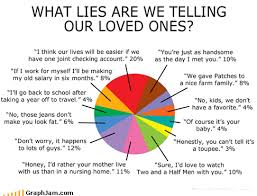Liars, Sociopaths and Psychopaths: The True Nature of Deception

Ever wondered why lying exists, or how to understand, catch, or be a liar? Read on, sir or madam. Here is some extensive, thorough, and entirely useful information related to lying, liars, and deception. Each overarching point is a capsule title. Use this information to your own detriment, to uncover deception, or simply as a point of reference in your pursuit of true evil. Enjoy.
Psychopaths Believe Lying is Necessary.
We can’t have friends, family, jobs, or live as a society without lies. Delusions are lies, but as the great scholar George Costanza once said, “It’s not a lie if you believe it!” That’s why parents tell their children (usually, not always) that they’re handsome/pretty and talented, and intelligent. Because they inherently trust their parent, and believe these words. The child may be those adjectives, but until they’re told that they’re talented by someone with a real authority on the subject, it’s just an opinion that may as well be a fact to the child.
But, what if a child grows up believing that they’re ugly, useless, and worthless? Many do. And it’s usually not the parents who instill these beliefs. It’s awful children they met at school or around the neighborhood. Now why would children say these things? It really just depends, but my belief is that no matter what reason that offensive child may give, I say that it’s because fundamentally we don’t like others to be happier than we are. As adults, we learn to filter our reactions to others’ fortunes by saying such platitudes as, “That’s great, you really deserve that!”, or “Wonderful! I’m really happy for you!” and yet as soon as that person leaves, we turn to our family, or friends and say, “God, what a big head they have, bragging about their lives like that,’ or “I bet they didn’t really earn that. They were probably handed that by dumb luck. I bet they’ll have bad luck soon.”
And since children don’t know enough to at least pretend to be happy for another person (a lie in itself), they spew out all that hatred and tear other children down. And so there are many children who do grow up feeling worthless, useless, neglected, and forgotten simply because no one was kind enough to lie to them. Cynical? Yes, I know. There’s a great episode of Everybody Loves Raymond about this. Ray has an invitation to speak on a sports radio show, and he completely bombs it. Afterward, his mother and father shower him with praise, yet his wife is the only one who gives honest criticism which, in turn, spirals Ray’s precious delusions out of control. We all create a glass house of delusion for ourselves by believing we’re special, handsome, intelligent, or in any way useful to the world, and every so often someone will come along and inadvertently hurl a pebble and shatter your house. Crash.
So, lying is necessary, for the nurturing of our growth as humans in society. Please do your best in this matter.

Experts Believe Lying Leads to More Lying
You know what they say about all sociopaths and serial killers. That they’re all compulsive liars. And in so doing, lying gets the eternal connotation that it’s entirely despicable. The real truth about sociopathic lying is that it is an oppressive and eventually compulsive activity. Of course, this follows the “slippery slope” logical fallacy. One leads to another, leads to another, leads to another, and eventually you’re stuck in a web of lies being eaten by a spider. Lies are what condemns a criminal, not the courts, nor a God. Excessive lying is a path that one takes that condemns the soul to becoming entirely detached from reality. That’s what cause crimes. If a criminal was thinking clearly about the truth; the truth of what their crimes’ burdens would be places on society, then they wouldn’t do it. But as your soul is denied truth, it is also denied sustenance. We craft our own prisons, the size of our heart, and condemn ourselves with every false word. Pretty great beginner philosophy, eh?
All Liars Follow Patterns
There are patterns to lies and liars.I learned this from being a salesman. Effective and ineffective lying follow patterns. Just like our emotions are written on our face as expression and microexpressions, our lies manifest physically and psychologically in our actions.
For example, salesmen smile when first meeting a potential client. Why? Because it opens up a doorway to the person’s heart. We all know that smiles between strangers are fake, but our inherent politeness in public makes it so that we automatically feel shame when not returning even a fake smile between strangers. Salesmen know this. They know that it is actually more unpleasant for a person to turn away from their fake smile, than stay and listen to a sales pitch that neither individual wants to be a part of.
Charm and romance are lies. What is a first date, after all, but a representation of our ability to bullshit another person? The truth about ourselves doesn’t come out until later, when we’ve already solidified a nonverbal agreement of attraction. It doesn’t even matter that the attraction was built upon a lie. Both our represented personality and our physical manifestation during first dates is entirely false. Do men always wear suits, have slicked back hair, and trim their nose hair? God no. And yet women are entirely willing to put aside their jaded intuition and dive right back into the deep end of naivete. The same is said for men. They know that that entirely attractive, charming, beautiful woman who doesn’t seem to have any flaws is just a mirage, and at best, a facade. But we’d rather believe in a lie than destroy an opportunity by listening to truth.
Take your friend for example. We all have that friend who is enamored with a woman or man that is, to the best of our knowledge, a crook. We try, mind, body, and soul to tell our friend that they’re making a mistake. That there’s something terrible going on, and they must not take part in the festivities. And all you see is that belligerent placidity in their face that means that they haven’t heard nor will they ever believe anything you say on the subject because “They know their date best.”
These patterns of liars are universal. We lie to ourselves about everything, and lie to others about a great deal as well. Learn how to deal with the truth. The raw, naked truth, and you’ll be on to something. The truth isn’t for the faint of heart, nor the feeble of mind. See the patterns in yourself and others, and learn to make judgment calls of whether the lies are helpful or harmful. Those are the only two adjectives to describe a lie.
How many lies do you tell per day? (average)
How to Detect and Control a Liar.
Having a “gut feeling” isn’t enough to spot and uncover a liar. Nor is that ever recommended. Exposing lies is the quickest way to lose friends, family, and love interests. Imagine it this way. Everyone is playing their own custom-made board game, and you’re the person who walks up to them and flips over the game board; pieces fly everywhere. Do you suppose they’re going to thank you for showing them the error of their ways? No. Never.
Imagine a woman who goes to a private investigator because she believes her husband is cheating on her. What are her motives? That really doesn’t matter to me. What matters is that somewhere inside her mind, she thinks her husband is capable of cheating, and she’s seeking the truth. It’s another story entirely when the truth arrives. Some run away from the truth, disposing of it as “completely impossible”, and yet some resign themselves to the truth and move forward to seek confrontation or reconciliation. The truth will set you free.
Now imagine another scenario. The private investigator knows this woman as an acquaintance and happens to find empirical evidence that her husband is cheating. He decides to do the honorable thing and show her the evidence. How do you suppose this is going to go? Usually not well. She wasn’t seeking the truth, even though it’s quite possible that she knew, deep down, about the cheating. He brought it to her, and more often than not, she will dispel the notions and dispose of the investigator as a friend.
I, myself, have been on both sides of the fence, and rarely does any of it go well. Even so, knowing the truth is the only way that we can grow and change as humans.
If you decide you want to uncover and expose a person’s lies, be sure to bring real evidence. Saying, “He seems like a mobster,” just isn’t good enough.
The best liars take into account their audience.
This is why it is more effective to lie to those you know well, like friends, family, and love interests. I didn’t say it was -easier-, just more effective. The reason is may be more difficult is due to reactive shame. “Pulling the wool over” someone you love may bring one to feel guilt or shame, or self-loathing. This is what causes many people to abstain from lying to loves ones. For those of you that don’t feel such emotions so acutely, or just have become desensitized to their effects, then I’m sure you will actually enjoy your own deceptions. For the rest of you, it’s only ever unpleasant, or at best, bittersweet.
But if you’re someone who is afraid being lied to, keep these things in mind when talking to those you love. Do they have a reason to lie? Do they gain anything from lying to you? These two questions weed out most liars. For most people, they only lie when they feel it’s necessary. And when it’s necessary, it’s usually for personal gain or for the gain of someone they’re aiming to protect (and in turn, that produces personal gain).
Most people have mythical ideas of how to detect liars. I’ve done extensive study into if there are universal physical properties of liars. And I’ve come to many conclusions. The first is:
-Bad liars tend to act similarly
-Good liars tend to act similarly
-Great liars tend to act similarly
-Superb liars follow their own compasses and all act differently, and are so undetectable that no matter what trap you’ve seemingly caught them in, there will always be reasonable doubt as to their guilt.
Lying is in the group of professions that is easy to learn and difficult to master. I don’t think I’m a master liar, but I am a master lie-detector. I can see the lies, but finding out why they lied is the more difficult part. Watch the show “Lie to Me” for more info on that hypothesis.
The Levels of Liars: Bad, Good, Great, Superb.
On bad liars and indicting and indicating them.
I’m sure you know some bad liars. People who completely change their tone of voice when saying something that isn’t true. They may even show extensive shame when voicing lies. They may even perspire, and avoid eye contact, or make extensive contact. Each of these things in and of itself doesn’t really concretely prove a lie, but rather that their mindset is set to extreme self-consciousness of their appearance and actions. They are trying to home in on what they’re saying and doing for a particular reason. And that reason is oftentimes lying. The more you know about a person’s behavior, the easier it is to pick out the statements and actions that are “not like the others”, just like in those pictures you saw as a child where the caption tells you to pick out the differences between the two pictures.
Oftentimes, with a bad liar, the picture of how they are on a daily basis is entirely offset when interposed or juxtaposed with how they are acting in the moment they are lying. That’s why our perception based in our hypothalamus and reticular formation throw up flags saying to us silently, “Something is off. Something is wrong. Danger?” Use this queasy, uneasy feeling as your lauchpad for investigation, if you wish to. You sense something is wrong, and if you choose to look into it further, please don’t start with, “I know you’re lying.” A liar will often retreat if they feel exposed, rather than expand or expound upon their lies. They will often dig an entire grave of lies before even exposing that one they initially told. It’s better to come at them with evidence and a peaceful demeanor. They won’t feel as threatened, and the exposure of their misdemeanor may lead to them confessing.
On Good Liars.
Good liars are essentially either bad liars who have learned through experience, or natural liars who lie out of habit. How you approach the liar depends entirely on which one they are. And the only way to tell that is to know how they were over a year ago. If they were a bad liar then, and you don’t detect such vibrant deception, then you are likely dealing with a newfound good liar. If you never knew them as a bad liar, then they are likely a natural liar, and in which case, good luck. Natural liars don’t have the inherent shame complex that others do. But it’s not impossible to expose their lies, but you have to go about it differently.
-With the upjumped bad liars you may see that they have stopped their bad habits. They may have lost some of that physical intensity when telling a lie. They don’t really look away, or look at you while doing it. They don’t sweat or stand awkwardly, either. The lie just seems to be a part of the natural progression of the situation or conversation. The biggest roadblock that these good liars seem to be held back by is not the physical conveyance of the lie, but the actual substance of the lie. I’ll get into more detail when it comes to the next tier of liar. Basically, the substance of their lie is debatable. You can overturn it with evidence, which is what you should do, while also appealing to their sense of morality.
-The natural liar will not have the same reaction when appealing to their morality. At least not if you appeal to their sense of guilt or shame. The only real way of uncovering their lie is to obtain evidence that overturns their information. If none exists, then they’re not just good liars. Use your detective skills and ask around. Merely a good liar will have left loose ends and it can usually easily be overturned if you ask around. With a natural liar, asking more questions to him may seem pointless, but each lie they are forced to give, gives you more of a chance to overturn the original one. Be patient, and exhaustive.
On Great Liars.
These ones don’t need a divergent path between natural and learned behavior. They have arrived at the same point for whatever reason, and that doesn’t even matter anymore. A person like this has a concrete, non-abstract reason for lying to you that won’t be shaken by questioning or interrogation nor even evidence. The best you can hope for is to have a personal intuited moment where you believe that they are lying, or have been lying in the past, and either make peace with it, or leave. You aren’t going to be able to change their behavior, nor will there be any real evidence to their lying. Great liars don’t tell lies that can be investigated beyond a reasonable doubt. Now, everyone makes mistakes, so yes, you may get lucky and find compelling evidence to their guilt in this matter, but you won’t get any satisfaction from exposing them. They won’t repent, or if they do, it will just be another lie, and you’ll be left with a bad taste in your mouth. On the off chance that you expose a great liar, it’s going to be more likely that they’ll have exposed themselves intentionally. Some people really take pride in their lying ability and some even go so far as to boast about it. If someone boasts about their ability to lie, then I would just take it as a joke, yet be wary of any further interaction with them in regards to exchanges of money, property, or engaging in any sort of contractual agreements. You are putting yourself in a position to get hurt, most likely. Liar beware, as they say.
Superb liars.
You may know one, but you don’t know of one. They have the timing and grace of a musician with their words. They may be anyone, and you’ll just have to take them at their word. The sad thing about superb liars is that they hide so well that their true motives are only myths. I can only hypothesize to why they would lie, and sometimes even that gives me sleepless nights full of pondering. These men or women can be killers, politicians, presidents, CEOs, or janitors or work in a soup kitchen. They may have been provided training on deception, and done research as well, and yet somewhere about 50% of the ones I’ve met and known have used their abilities for personal gain. I initially thought, “Why wouldn’t they use their prodigious lying abilities to gain them everything they would ever want? If they don’t have the shame reflex on lying, then I’m sure they can just do whatever they want, right?” Well, every lie is a risk of being uncovered, right? And the more popular you are in the public arena, then every lie is magnified into a scandal, right? Well, the stress of executing a lie compounds more and more for however many variables are included in the process. In the last section, I’ll explain more in-depth to how a liar thinks.
How to Lie Effectively
I’m sure you’ve learned something about lying and liars so far, but this section is meant to be something akin to how a liar processes an opportunity or even gauges if an opportunity is truly an opportunity to lie. Just as in armed combat, one must look toward an opponent’s weak spots to attack. Or how a thief cases his target to see how to proceed while minimizing risk to oneself. Or even how one succeeds at a job. Using your knowledge of interpersonal interactions is most important.
Step One: Know Your Target
Get to know them. Learn their likes, dislikes, and gauge their intelligence and levels of perception. What are their perceptual blind spots, what are their moral ambiguities. And most importantly, are they a liar? If they lie well, then chances are they will recognize your own behavior before you even finish a sentence.
Step Two: Know the Context of the Situation
What are you hiding, altering, or subjugating? Will your target be able to find the trail of breadcrumbs that leads to the truth of the situation? Is there even evidence to be found? If necessary, destroy the evidence before lying, or establish plausible and provable alibis beforehand. Destroy coincidences, and circumstantial evidence that may cause a person to become suspicious. If your lie blatantly turns a situation conveniently in your direction, then you have painted yourself as a target of increased scrutiny.
Step Three: Delivery, Timing, and Integration of Truth
For any good liar, the first two are no-brainers. The third is something that must be changed due to context and situation. Memorize your lie backward and forward (as an interrogator will sometimes ask you to recite your lie backward to see if it is encoded into memory only in one direction), and be sure to keep your voice equivalent to the surrounding sentences, and your mannerisms the same as what precedes and follows the lie. They may suspect the words, but they won’t be able to suspect the delivery.
“The truth is hidden in the bushes.” I say it as, “The lie is hidden amongst the truth.” Like that game you used to play as a kid (or a student), called “Two Truths and a Lie.” It’s an exercise in being able to choose a lie that may have some granule of truth to it. The less you alter the truth, the less risk of uncovering the lie there is.
Step Four: Remember Your Lies
If asked to recall your previous words/lies/etc, always remember exactly what you said before. But be careful not recite the lie exactly the same. Add some "ers" and "ahs" and "ums" while changing out some words with synonyms so that it's more organic. They may not remember your exact phrasing, but in case they do, it's important to be too exact in your repetition. If you say it exactly the same, they'll become increasingly suspicious. Remember what you said to whom is incredibly important, and yet minimizing how many variables you need to keep track of is also very important.
If in doubt about what you exactly said, ask them to repeat your own words, citing your own memory issues. Say they tell you that you said, "I was at the party on saturday night." use this as a trigger to remember what you exactly said. If you remember that you said precisely, say, "Ah yes. I said 'I wanted to go to the party Saturday." and cite that there's a technical difference. They will believe that you didn't remember your words, and be more likely to believe you.
Ah. Now that you’ve made it this far.
Use all this information wisely. You can go catch liars, or become one. Or do both. Good luck to you, and I probably wouldn’t take any of this seriously.








